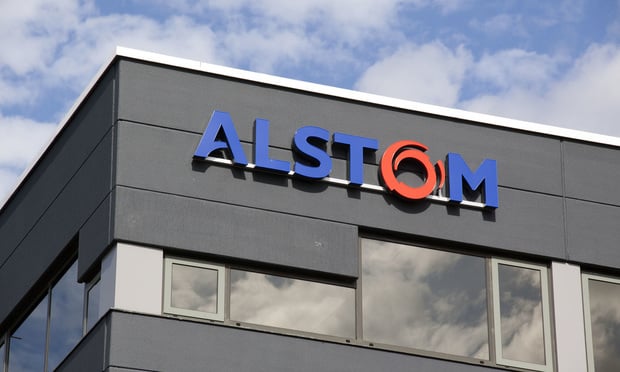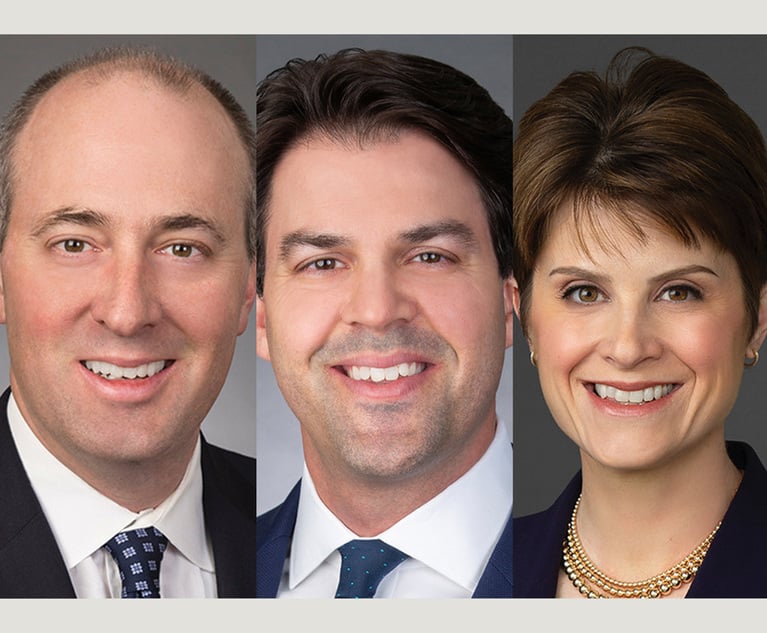Daily Dicta: What Went Wrong for the Defense in Alstom Exec's FCPA Trial
While defense counsel Christopher Morvillo of Clifford Chance vigorously argued that his client was technically beyond the reach of the FCPA, Justice Department prosecutors spun a tale of corruption that jurors may have found more emotionally compelling.
November 12, 2019 at 01:43 AM
6 minute read
 A square peg into a round hole.
A square peg into a round hole.
That's how Clifford Chance partner Christopher Morvillo in his closing argument described the government's efforts to convict his client—a British citizen working in Paris for French multinational Alstom—of violating the Foreign Corrupt Practices Act by allegedly approving the payment of bribes to officials in Indonesia.
But sometimes, you can still make the peg fit—you just have to jam it in.
In a way, that's what happened on Friday, when a federal jury in Connecticut found 69-year-old Lawrence Hoskins guilty of violating the FCPA, as well as money laundering.
The verdict in the closely-watched case sent shivers through the defense bar. "In this case, the conduct at issue took place in 2002, Mr. Hoskins was indicted in 2013, and found guilty in 2019," noted Audrey Ingram, a partner at Richards Kibbe & Orbe. "This case will be a cautionary tale used in every corporate anti-corruption training about the broad scope of U.S. enforcement."
 What went wrong for the defense?
What went wrong for the defense?
Trial transcripts give a sense of how the argument unfolded. While Morvillo vigorously argued that his client was technically beyond the reach of the FCPA, Justice Department prosecutors spun a tale of corruption that jurors may have found more emotionally compelling.
Consider how DOJ prosecutor Daniel Kahn kicked off his closing.
"The defendant chose to walk down a path of corruption and cover up. He chose to join a criminal conspiracy to pay bribes and launder money," Kahn said. "The defendant made the choice to commit crimes over and over and over again."
And the thing is, it does seem clear that bribes were paid in connection with Alstom's Tarahan Project—a $118 million contract to provide power-related services to the citizens of Indonesia. In 2014, Alstom pleaded guilty to FCPA violations and agreed to pay $772 million in fines.
But could Hoskins be held personally responsible for some of the wrongdoing? Could a British citizen even be guilty of violating the FCPA if he never set foot in the United States or worked directly for Alstom's Connecticut-based U.S. subsidiary, Alstom Power Inc., or API?
The U.S. Court of Appeals for the Second Circuit in an interlocutory appeal last year held that prosecutors had to prove that Hoskins was an agent of a domestic concern to make FCPA charges stick.
As Morvillo told the jury, "Unless the government can prove that Mr. Hoskins was in fact acting as an agent of API, every single one of their FCPA charges fails. Every single one of them, gone. Counts One through Seven, out the door."
The FCPA doesn't define agent, but here's how U.S. District Judge Janet Bond Arteron instructed the jury.
"An agent is a person who agrees to perform acts or services for another person or company," she said. "To create an agency relationship, there must be, one, a manifestation by the principal that the agent will act for it; two, acceptance by the agent of the undertaking; and, three, an understanding between the agent and the principal that the principal will be in control of the undertaking."
She continued, "One may be an agent for some business purposes and not others. Here the government must prove that the defendant was an agent of a domestic concern in connection with the specific events related to the Tarahan Project."
So was Hoskins an agent of API?
Kahn said yes. "What were the things that the defendant was actually doing for API? He was helping with sales efforts. He was helping identify consultants. He was helping to vet and hire consultants. He was helping to negotiate the terms of payments," Kahn said. "And so who controlled that undertaking, ladies and gentlemen? That was API."
But Morvillo countered that it wasn't so simple.
"Don't be distracted by arguments that are about other functions that Mr. Hoskins played in the effort to get the Tarahan deal. Mr. Hoskins' alleged role in the alleged crime is the hiring of agents to pay bribes, and that is what he needed to be an agent for API for the purposes of this case," Morvillo said.
He offered a real-world example. "I have two incredible daughters, 18 and 22 years old. I support them in many different ways. Does that mean that I'm under their control and I have to do what they say? Of course not. Just please don't tell them."
Here, Hoskins hired the two consultants who allegedly paid the bribes in Indonesia. In this matter, Morvillo argued, he was the boss.
"He is the one who had control and authority to approve the commercial terms of those engagements," Morvillo said. "That is what his job was … to oversee the hiring of consultants. Oversight. Does that sound like an agent as the court has defined it for you? Does that sound like someone who is under the control of the people who want to hire the agents or is it the other way around?… API does not control Mr. Hoskins in this role. They have to defer to him."
While this may be legally sound, it's not what you'd call a feel-good argument. Hoskins should be acquitted because he was in charge of hiring the alleged bribe payers?
After a day of deliberation, the jury sided with the government.
In a statement, Morvillo said, "To say we are disappointed by the jury's verdict is a massive understatement. Lawrence Hoskins is innocent of these charges, which relate to conduct by a British citizen that occurred more than 15 years ago entirely outside the U.S. We will continue to work tirelessly towards clearing Lawrence's good name and allowing him to return to England to retire in peace."
This content has been archived. It is available through our partners, LexisNexis® and Bloomberg Law.
To view this content, please continue to their sites.
Not a Lexis Subscriber?
Subscribe Now
Not a Bloomberg Law Subscriber?
Subscribe Now
NOT FOR REPRINT
© 2025 ALM Global, LLC, All Rights Reserved. Request academic re-use from www.copyright.com. All other uses, submit a request to [email protected]. For more information visit Asset & Logo Licensing.
You Might Like
View All
Litigators of the Week: A $604.9M Trade Secrets Verdict With a Big Assist From a Juror Question

Litigators of the Week: A Reset in the Fight Over Nearly $2B in Bonds Issued by Venezuela's National Oil Company

How Kirkland & Ellis Litigators Became a National Brand in Oil and Gas

Dorsey & Whitney Hits Back Against Complaint Claiming Firm Dragged Its Feet on Malpractice Suit Against Fellow Big Firm
Trending Stories
Who Got The Work
J. Brugh Lower of Gibbons has entered an appearance for industrial equipment supplier Devco Corporation in a pending trademark infringement lawsuit. The suit, accusing the defendant of selling knock-off Graco products, was filed Dec. 18 in New Jersey District Court by Rivkin Radler on behalf of Graco Inc. and Graco Minnesota. The case, assigned to U.S. District Judge Zahid N. Quraishi, is 3:24-cv-11294, Graco Inc. et al v. Devco Corporation.
Who Got The Work
Rebecca Maller-Stein and Kent A. Yalowitz of Arnold & Porter Kaye Scholer have entered their appearances for Hanaco Venture Capital and its executives, Lior Prosor and David Frankel, in a pending securities lawsuit. The action, filed on Dec. 24 in New York Southern District Court by Zell, Aron & Co. on behalf of Goldeneye Advisors, accuses the defendants of negligently and fraudulently managing the plaintiff's $1 million investment. The case, assigned to U.S. District Judge Vernon S. Broderick, is 1:24-cv-09918, Goldeneye Advisors, LLC v. Hanaco Venture Capital, Ltd. et al.
Who Got The Work
Attorneys from A&O Shearman has stepped in as defense counsel for Toronto-Dominion Bank and other defendants in a pending securities class action. The suit, filed Dec. 11 in New York Southern District Court by Bleichmar Fonti & Auld, accuses the defendants of concealing the bank's 'pervasive' deficiencies in regards to its compliance with the Bank Secrecy Act and the quality of its anti-money laundering controls. The case, assigned to U.S. District Judge Arun Subramanian, is 1:24-cv-09445, Gonzalez v. The Toronto-Dominion Bank et al.
Who Got The Work
Crown Castle International, a Pennsylvania company providing shared communications infrastructure, has turned to Luke D. Wolf of Gordon Rees Scully Mansukhani to fend off a pending breach-of-contract lawsuit. The court action, filed Nov. 25 in Michigan Eastern District Court by Hooper Hathaway PC on behalf of The Town Residences LLC, accuses Crown Castle of failing to transfer approximately $30,000 in utility payments from T-Mobile in breach of a roof-top lease and assignment agreement. The case, assigned to U.S. District Judge Susan K. Declercq, is 2:24-cv-13131, The Town Residences LLC v. T-Mobile US, Inc. et al.
Who Got The Work
Wilfred P. Coronato and Daniel M. Schwartz of McCarter & English have stepped in as defense counsel to Electrolux Home Products Inc. in a pending product liability lawsuit. The court action, filed Nov. 26 in New York Eastern District Court by Poulos Lopiccolo PC and Nagel Rice LLP on behalf of David Stern, alleges that the defendant's refrigerators’ drawers and shelving repeatedly break and fall apart within months after purchase. The case, assigned to U.S. District Judge Joan M. Azrack, is 2:24-cv-08204, Stern v. Electrolux Home Products, Inc.
Featured Firms
Law Offices of Gary Martin Hays & Associates, P.C.
(470) 294-1674
Law Offices of Mark E. Salomone
(857) 444-6468
Smith & Hassler
(713) 739-1250






